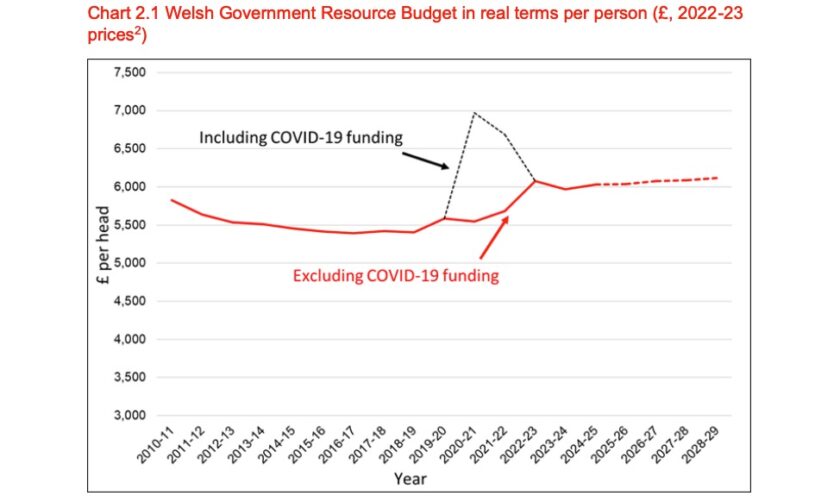Welsh Government budget: “A real terms reduction in our spending power of up to £1.3bn”

Welsh Government have detailed the context to why they feel their budget is ‘has presented the most stark and painful budget choices for Wales in the devolution era’.
Welsh Government have published their draft budget documents (as reported here). The publication covers the Welsh Government’s draft budget proposals for 2024-25 as well as setting out strategic and detailed spending plans for revenue and capital, as well as taxation and borrowing.
One area covered in the documents is the context of the budget, with Welsh Government pointing to a range of external factors for the tight finances.
They say, “If our budget had kept pace with the growth in the economy since 2010, we would have had an additional £3bn to spend on public services and support for people and businesses in Wales in 2024-25.
“Instead, we are facing a real terms reduction in our spending power of up to £1.3bn since our budget was set in 2021.”
Several pages refer to outside factors including:
- Austerity
- Impacts of the UK leaving the EU
- Global pandemic
- Increasing impacts of climate change
- Cost-of-living crisis
- Inflationary pressures linked to the war in Ukraine
Welsh Government point to Westminster, “Most of our funding continues to come directly from the UK Government as a block grant, even following the devolution of some tax-varying powers. This means Wales is directly exposed to UK Government fiscal policy and the political decisions driving it as we move closer to a General Election.”
The top graph is provided early in the budget packs, noting “The UK Government’s Autumn Statement provides some very modest additional allocations for the Welsh Government’s budget in 2023-24 and 2024-25. Because of the inflation shock over the last few years, the Welsh Government’s settlement over the three years of the current Spending Review period is worth considerably less in real terms than expected at the time of the review in 2021”.
As shown in the chart “…having fallen by 7% in real terms during the last decade, recent increases mean the Welsh Government’s Budget for day-today spending in 2023-24 is around 3% higher per person than in 2010-11 in real terms, but lower than in 2022-23. It remains below the 2022-23 level in 2024-25”.
The Finance Minister in her introduction to the documents referred to much of the above, her opener is in full below:
Devolution means decisions about Wales are made in Wales, including decisions
about spending. But the way our funding settlement is structured – the majority of
our funding continues to come from a block grant from the UK Government,
reflecting spending decisions in devolved areas in England – means we are exposed
to the full force of politically-driven decisions made in Westminster.
Over the last 13 years, successive UK governments have given us more than a
decade of austerity, a botched Brexit deal and a disastrous mini budget, which
almost crashed the economy. Despite our best efforts to shield public services,
businesses, and the Welsh population from the worst impacts of these policies, each
have individually and collectively had a significant and lasting impact on Wales.
During this period, we have also experienced the Covid-19 pandemic, wars in
Ukraine and the Middle East, persistently high inflation, a cost-of-living crisis, and we
continue to respond to the ever-increasingly visible signs of the nature and climate
emergencies.
At the Autumn Statement last month, the Chancellor signalled a fresh round of
austerity, as he chose to use his fiscal headroom to make relatively modest tax cuts
and focus on short-term projects in marginal constituencies, rather than restore
funding to fragile and brittle public services.
The choices he made have short-term consequences on the decisions we can take
in Wales in this budget round, and they will have longer-term consequences across
the UK as public services once again face deep and damaging cuts because they
have been deprived of real investment.
For the second year in a row, our funding settlement is not sufficient to respond to
the extraordinary pressures Wales faces, including persistently high inflation, the
cost-of-living pressures people and businesses continue to experience, unfunded
public sector pay rises or to recognise rising demand for services
You can read the full budget document here.
Spotted something? Got a story? Email [email protected]












